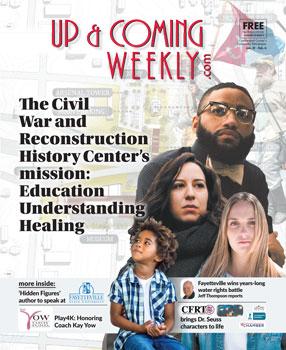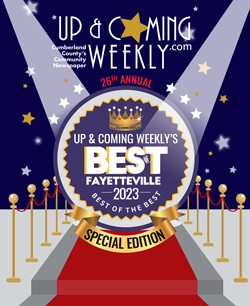 History is not always pretty. But an honest examination of the past can be valuable in educating the generations that follow, ensuring past atrocities never again occur and, for many, offering an avenue for healing and forward motion. The Civil War and Reconstruction History Center seeks to tell the stories of all those involved in and affected by the Civil War: soldiers who fought for both the Union and the Confederacy; enslaved people for whom the invasion by U.S. troops meant liberation; free blacks caught in the middle of warring armies; and the women and children left behind to fend for themselves as their husbands, sons and fathers went to war. These are the people the history center hopes to highlight.
History is not always pretty. But an honest examination of the past can be valuable in educating the generations that follow, ensuring past atrocities never again occur and, for many, offering an avenue for healing and forward motion. The Civil War and Reconstruction History Center seeks to tell the stories of all those involved in and affected by the Civil War: soldiers who fought for both the Union and the Confederacy; enslaved people for whom the invasion by U.S. troops meant liberation; free blacks caught in the middle of warring armies; and the women and children left behind to fend for themselves as their husbands, sons and fathers went to war. These are the people the history center hopes to highlight.
The Civil War is, with good reason, a subject that both skeptics and supporters agree must be treated thoroughly and with an emphasis on education rather than simply memorialization.
Fayetteville Mayor Mitch Colvin, our city’s second African-American mayor, cautiously supports the proposed Civil War and Reconstruction History Center. Colvin agrees with supporters that Fayetteville is ready for another world-class institution like the Army’s Airborne & Special Operations Museum to solidify the city as a tourist destination.
Tisha Waddell, who is black, is the councilwoman who replaced Colvin as the member representing the Murchison Road area’s District 3. She said she sees the History Center as an opportunity that will benefit the community. At a recent council meeting, she said the controversy that still surrounds the subject of the Civil War is precisely why an education center dealing with that period in American history is needed.
“Whenever history is told, all sides must be equally represented,” she said. “If that’s done, it could be powerful.”
Organizers said they will take “an evenhanded approach to the state’s Civil War experience precisely because no one agreed on it then, and no one agrees on it today.”
The Reconstruction period, 1867-77, was an attempt to repair the rift between the North and the South. It did not. However, during that time, life for blacks didn’t change much. President Abraham Lincoln’s Emancipation Proclamation of 1863 freed only those slaves held in the Confederate states. Emancipation became universal with the adoption of the 13th Amendment to the Constitution, which Congress passed in January 1865, and it became national policy.
Given little guidance from Washington, Southern whites turned to their traditional political leaders for reorganization of their state governments. The results were suspiciously like those of the antebellum period. To be sure, slavery was abolished; but each reconstructed Southern state government adopted a “Black Code,” regulating the rights and privileges of freedmen. The 14th Amendment was designed to provide citizenship and civil liberties to freed slaves.
Hiram Revels, born a free man in Fayetteville, became the first African-American to serve in the U.S. Congress. He was a minister in the Methodist Episcopal Church and was called to be a permanent pastor of a church in Natchez, Mississippi. In 1870, Revels was elected to finish the term of one of Mississippi’s two seats in the U.S. Senate, which had been left vacant since the Civil War. The South had been economically devastated. The Union was preserved and restored, but the cost in physical and moral suffering was incalculable.
This history and much more is what the center is all about. As its founding documents make clear, “The History Center is designed to be a ‘teaching museum’ rather than a ‘collecting museum.’” It would be owned and operated by the state Department of Natural and Cultural Resources. The site chosen for the facility is the location of one of North Carolina’s most important Civil War sites, the Federal Arsenal in Haymount, now often referred to as the Fayetteville Arsenal. History Center Foundation President Mac Healy said this will not be “a museum full of relics, weapons, uniforms and such.” The North Carolina Civil War and Reconstruction History Center will be about lifestyles, teaching an understanding of honor and respect for all the people whose individual contributions and sacrifices, woven together, create the complex tapestry that is our nation’s, our state’s, our community’s history. As stated in the foundation’s literature, “Visitors to the Center should get a sense of stepping into the shoes of these individuals … from a place of compassion and understanding and what it was like to face extreme challenges that are unimaginable today.”
Often overlooked is that life on the homefront was risky business, especially for women, whose purpose in life was often reduced to not much more than bearing babies. An example of what passed for success was provided by a Cumberland County woman – a planter’s wife – who, after 15 live births and a couple of miscarriages finally had a whole decade of freedom from childbearing to enjoy before dying in her mid-50s. Her epitaph was a model of understatement: “She hath done what she could.”
The History Center will, in addition to being a place of education and reflection, serve as a hub for economic development and tourism. Officials estimate the History Center will draw upward of 130,000 visitors to the community annually. Healy said studies indicate that destination tourists stay twice as long and spend twice as much as travelers. Additionally, the History Center will produce more than 150 service industry jobs. It is projected to generate $12 million a year in economic impact for our region.
“Good economic development such as the History Center will grow the tax base rather than be a constant financial drain on the community,” Healy said.
Professors from the University of North Carolina System are compiling research for the center that will also serve as Civil War history curriculum for Tar Heel schoolchildren. The History Center will include a 60,000 square-foot main building. Two other buildings on the site, including the original Arsenal House, will be renovated. The center’s foundation has already raised about $27 million of the $65 million project cost. This includes $5 million from the state, $7.5 million each from Cumberland County and the city of Fayetteville and $7 million in private, mostly local, commitments. The city has agreed to a withdrawal of $250,000 from its fund if the county does the same.
Learn more about the History Center at http://nccivilwarcenter.org.

 How to resolve AdBlock issue?
How to resolve AdBlock issue? 









